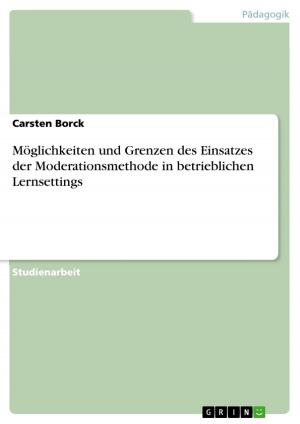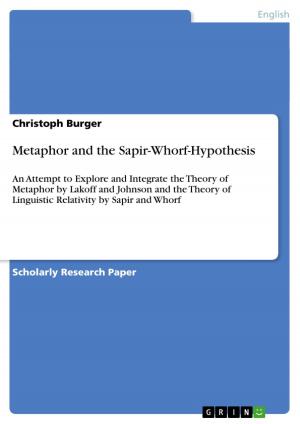Women's sexual liberation from victorian patriarchy in Sheridan Le Fanu's Carmilla
Nonfiction, Entertainment, Drama, Anthologies| Author: | Ilona Gaul | ISBN: | 9783638860284 |
| Publisher: | GRIN Verlag | Publication: | November 16, 2007 |
| Imprint: | GRIN Verlag | Language: | English |
| Author: | Ilona Gaul |
| ISBN: | 9783638860284 |
| Publisher: | GRIN Verlag |
| Publication: | November 16, 2007 |
| Imprint: | GRIN Verlag |
| Language: | English |
Seminar paper from the year 2004 in the subject English Language and Literature Studies - Linguistics, grade: 1,7, University of Marburg (Institute for English and American Studies), course: Blood, Lust and (Un)Death: Vampires in American and British Cultures, 10 entries in the bibliography, language: English, abstract: Carmilla is the concluding story of Joseph Sheridan Le Fanu's horror story collection In a Glass Darkly which was published in 1872. Carmilla does not simply complete this collection but raises the topic of lesbianism and thus conveys the most provocative idea of all preceding texts. Considering the extreme prudery prevailing during the Victorian age, the publication of Carmilla represented a real scandal ignoring the severe, moral restrictions of that time. Women were not understood as sexual beings and moreover, homosexuality was a term people were absolutely ignorant of. An erotic relationship with a partner of the same sex was a thing people could not think or dared not to think of. Among others McCormack states, 'We begin with a pious clergyman and end with lesbianism, the offence Queen Victoria found unbelievable.' (McCormack 154). Nevertheless or even because of this, Carmilla is Le Fanu's best remembered work and considered one of the most influential texts of English vampire literature. It is not without reason that Carmilla served Bram Stoker as an inspiration for his novel Dracula which has been the most popular piece of vampire literature until today. Carmilla is set in Styria with no apparent hint when it takes place. The two protagonists Laura and Carmilla are both young girls whose relationship becomes more and more erotic as the story proceeds. Together with her father and a few servants, Laura lives very isolated in the family's castle with no surroundings but forest for miles. She is more than happy to have finally found a companion in the beautiful Carmilla. Carmilla who turns out to be a vampire seduces Laura and loftily confesses her love to Laura more than once. While the reader is aware of Carmilla's nature quite early, Laura ignores the obvious until the very end. Laura has ambiguous feelings for her female lover. On the one hand she feels drawn towards her; on the other hand she has a revulsion against Carmilla's strange behaviour. During the process of Laura being vampirized, she becomes weaker every day and more and more similar to Carmilla. Laura's father watches this proceeding sorrowfully without being able to help it. In the following, I will show that Laura's devotion to Carmilla exercised through the vampiric act can be read as a female escape from patriarchal chains. The male characters that all play minor roles lose control of the events and are powerless against the unknown enchantment Carmilla radiates.
Seminar paper from the year 2004 in the subject English Language and Literature Studies - Linguistics, grade: 1,7, University of Marburg (Institute for English and American Studies), course: Blood, Lust and (Un)Death: Vampires in American and British Cultures, 10 entries in the bibliography, language: English, abstract: Carmilla is the concluding story of Joseph Sheridan Le Fanu's horror story collection In a Glass Darkly which was published in 1872. Carmilla does not simply complete this collection but raises the topic of lesbianism and thus conveys the most provocative idea of all preceding texts. Considering the extreme prudery prevailing during the Victorian age, the publication of Carmilla represented a real scandal ignoring the severe, moral restrictions of that time. Women were not understood as sexual beings and moreover, homosexuality was a term people were absolutely ignorant of. An erotic relationship with a partner of the same sex was a thing people could not think or dared not to think of. Among others McCormack states, 'We begin with a pious clergyman and end with lesbianism, the offence Queen Victoria found unbelievable.' (McCormack 154). Nevertheless or even because of this, Carmilla is Le Fanu's best remembered work and considered one of the most influential texts of English vampire literature. It is not without reason that Carmilla served Bram Stoker as an inspiration for his novel Dracula which has been the most popular piece of vampire literature until today. Carmilla is set in Styria with no apparent hint when it takes place. The two protagonists Laura and Carmilla are both young girls whose relationship becomes more and more erotic as the story proceeds. Together with her father and a few servants, Laura lives very isolated in the family's castle with no surroundings but forest for miles. She is more than happy to have finally found a companion in the beautiful Carmilla. Carmilla who turns out to be a vampire seduces Laura and loftily confesses her love to Laura more than once. While the reader is aware of Carmilla's nature quite early, Laura ignores the obvious until the very end. Laura has ambiguous feelings for her female lover. On the one hand she feels drawn towards her; on the other hand she has a revulsion against Carmilla's strange behaviour. During the process of Laura being vampirized, she becomes weaker every day and more and more similar to Carmilla. Laura's father watches this proceeding sorrowfully without being able to help it. In the following, I will show that Laura's devotion to Carmilla exercised through the vampiric act can be read as a female escape from patriarchal chains. The male characters that all play minor roles lose control of the events and are powerless against the unknown enchantment Carmilla radiates.















